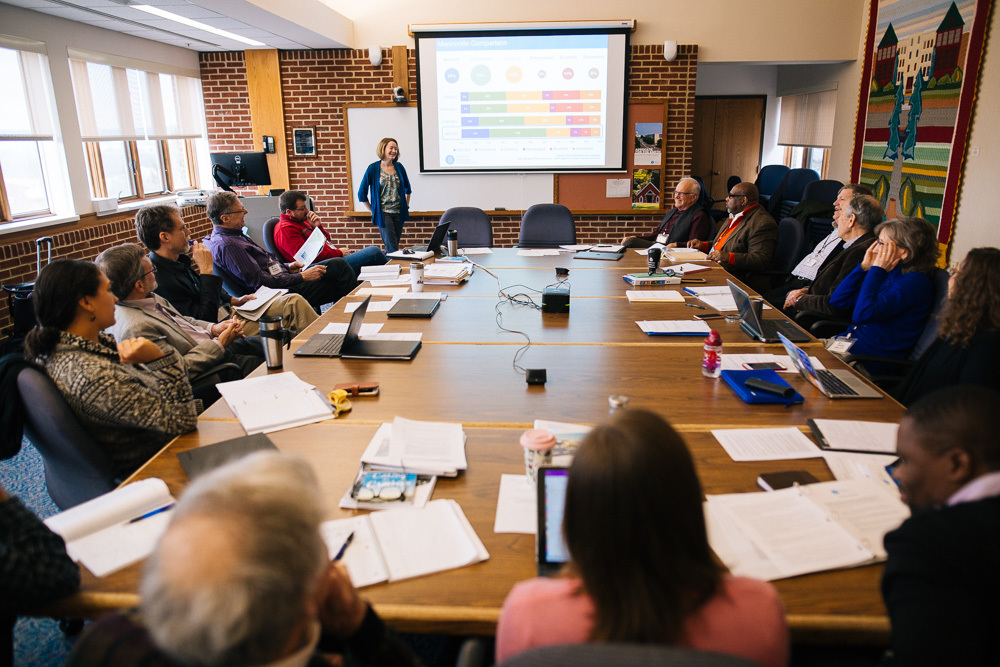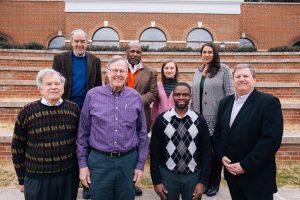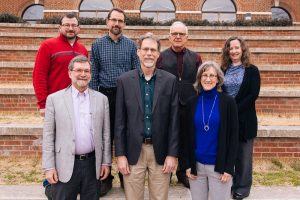Faith and climate change: Experts give input at BOR meeting for Center for Sustainable Climate Solutions
by Lauren Jefferson, Eastern Mennonite University

With a series of new programs taking shape, The Center for Climate Change Solutions hosted its first board of reference meeting March 9-10 at Eastern Mennonite University.
The nine-member board “brought a huge range of expertise to our discussion,” said the center’s executive director Doug Graber Neufeld, a biology professor at EMU. “The meeting was an opportunity to get feedback on our activities and think about how we might want to adjust our plans. I have so many new ideas that my head is spinning.”
Board of reference members Ben Brabson, professor emeritus of physics at Indiana University, Bloomington, and Shantha Alonso, executive director of Creation Justice Ministries, praised the work so far – especially “the evidence-based shaping of the center’s mission and programs,” Alonso said.

Joining Alonso and Brabson on the board are:
- Ray Martin ’66, lead donor and honorary chair;
- Russell De Young, retired NASA engineer;
- Mitch Hescox, president/CEO, Evangelical Environmental Network;
- Chad Horning ’91, chief investment officer, Everence;
- Lawrence Jennings, lay pastor, Infinity Mennonite Church, New York City;
- Jacqui Patterson, director, NAACP Environmental and Climate Justice Program;
- Lyubov Slashcheva D.D.S.;
- Vurayayi Pugeni, humanitarian relief and disaster coordinator, Mennonite Central Committee Canada.
Careful groundwork leads to plans in motion
This is the second major meeting since the center was founded in May 2016, funded by a $1 million donation from Martin, a Goshen College (Indiana) alumnus who worked in international development and global health. The collaborative initiative, which includes EMU, Goshen and Mennonite Central Committee, seeks to advance thinking and action in Anabaptist and other faith communities to mitigate climate change.
A May 2017 consultation at Goshen drew 25 representatives from Mennonite organizations to set the mission and objectives for the center.
Following a winter 2017 survey of Anabaptists, the center has rolled out a slate of programs focused on student leadership, pastoral and congregational leadership, and support for research into best practices and innovative solutions for climate change adaptation and mitigation efforts.

“That 10 months since that consultation has been really important to developing a mission-focused, data-driven foundation,” said Graber Neufeld. “There’s so much we can try to do towards our goals, but we want to focus our efforts on making the most impact, and it’s taken some time to find out what that means.”
Graber Neufeld says that continuing to build strategic partnerships will be key to the center’s success. Founding partner Mennonite Central Committee, for example, is a member of Alonso’s ecumenical organization, Creation Justice Ministries.
‘A new, able and unique partner’
CSCS will be a “new, able and unique partner,” said Alonso, who welcomed the board of reference meeting as a way to learn more about the Mennonite faith and its connection to sustainable climate solutions.
“CSCS can not only draw more Mennonites into care for God’s creation, but also be a witness of peacemaking and simple living for the broader climate movement, as well as the general public.”
From a personal perspective, veteran climate scientist Brabson said his participation was a rare opportunity to “form new friendships with a magnificent group of people dedicated to doing God’s work on Earth.”
He praised the center’s strong financial and organizational foundation and its careful goal- and action-oriented planning to spend resources where they have maximum impact.
Outreach to other faith communities is happening “by word and by example from the Mennonite tradition,” Brabson said. “Moral agency, so well represented by the Mennonite tradition, is critical to the survival and enhancement of all of our lives, especially the disenfranchised among us.
“Discussion is good, but without action, very little benefit results,” he added. “The center’s careful planning bodes well for the ability of the center to deliver on its promise.”




